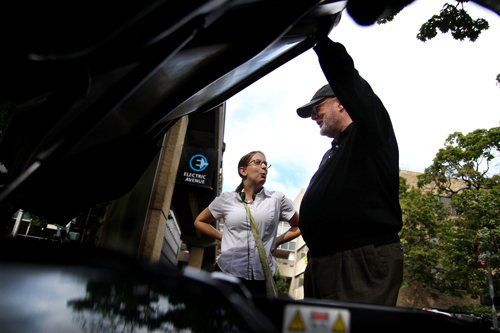The first of its kind in the nation, Electric Avenue’s charging station, unveiled on Feb. 29 could change the entire model of electric vehicle charging, simply by using a battery. “It is wonderful to have this new station on Electric Avenue,” said Stan Sittser, transportation electrification project manager at Portland General Electric. “It is a terrific test bed for electric vehicle charging and information gathering. It is a showcase for new technology.”
Quick-charge cars at Electric Avenue
The first of its kind in the nation, Electric Avenue’s charging station, unveiled on Feb. 29 could change the entire model of electric vehicle charging, simply by using a battery. “It is wonderful to have this new station on Electric Avenue,” said Stan Sittser, transportation electrification project manager at Portland General Electric. “It is a terrific test bed for electric vehicle charging and information gathering. It is a showcase for new technology.”

The new direct-current quick-charging station takes a different approach from other quick-charging models. The typical model draws 50 kilowatts from the power grid while charging vehicles. This new model uses a battery to help charge vehicles, significantly reducing the draw on the grid to only 20 kilowatts. Additionally, it is cheaper to operate and install, which, according to George Beard, alliance manager at Portland State’s Office of Research and Strategic Partnerships, increases the value of quick-charging stations in larger urban areas.
Capable of completing three back-to-back charges before completely depleting, the battery recharges itself. The new station is classified as a level-three charger and provides a full charge in approximately 30 minutes. Lower-level chargers can take anywhere from five to 16 hours to complete a full charge. For just 10 minutes at the new station, electric cars can get nearly 50 miles of electric fuel. This significant jump in charging time makes it a more efficient model than previous charging stations.
“We have noticed that a lot of cars that can be charged, go to the quick charger for only five to 10 minutes to get a ‘big gulp,’” Beard said. “Everyone is busy and we do not have time to sit around for so long plugged in. The popularity of quick chargers is very high, and the utility for busy people is very high.”
The Institute for Sustainable Solutions works with the research office to ensure the success of Electric Avenue. According to Jenny DuVander, director of communications at the ISS, urban sustainability and transportation is a key aspect of the research expertise at PSU. “Portland is on the leading edge of understanding the future of moving people around cities in a sustainable way,” she said.
Electric vehicle technology may become of great interest in the next few years as gas prices could reach five dollars a gallon over the summer. “Nobody has money to burn in their gas tank like that,” Beard said.
Other advantages of electric vehicle technology include not being dependent upon the volatile prices of imported gas. Oregon also has some of the most reliable and least costly electricity in the U.S. As the electricity is domestic, money spent on it is kept in the local economy and not sent overseas.
“People are becoming more aware of electric vehicles and the reception is still positive. As fuel prices go up, more will start considering electric vehicles,” wrote John MacArthur, sustainable transportation program manager at the Oregon Transportation Research and Education Consortium, in an email. “Everyday more charging stations are being placed in cities around the country and the state. There will be a direct correlation with the number of vehicles sold. The next couple of years will be very interesting,” MacArthur said.
The new battery-assisted charger is worth approximately $100,000 and was provided at no cost by the Japanese company Kanematsu. Different countries in the region, like General Electric, provide the other chargers. “A lot of companies are interested in participating; it is novel,” Beard said.
PGE is providing the electricity and PSU is paying for it. Customers do not have to pay to charge their vehicles. The only charge for patrons of Electric Avenue is parking. Lessons learned from Electric Avenue are shared throughout the industry. “It really puts Portland on the map,” Sittser said.
There are very few quick-charging stations in the nation. Portland has four, and two of them are found on Electric Avenue. The new station joins six other charging stations on Electric Avenue, including another direct-current quick-charging station that doesn’t use battery-assisted technology. Electric Avenue is a two-year research and development project between PSU, PGE and the City of Portland.
“This is just the latest chapter in a much larger story,” Beard said. “We have gotten a tremendous amount of interest not only around the country but also around the world. As far as we can tell, there is nothing quite like Electric Avenue in the world.” ■




